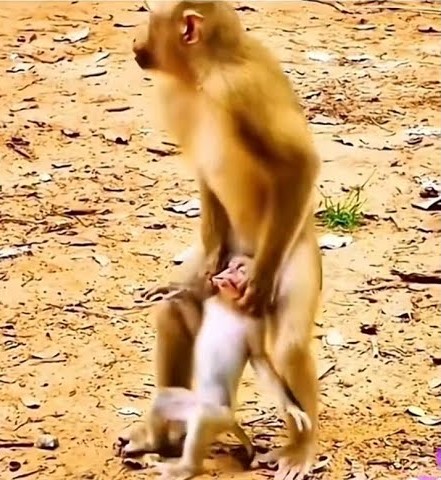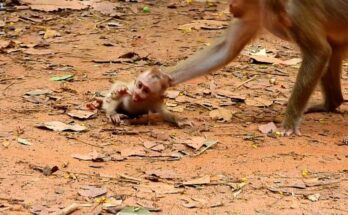In the animal kingdom, interactions between mothers and their offspring can be both tender and harsh, shaped by instinct, survival, and complex social behavior. One such moment captured attention recently: a young infant monkey crying inconsolably as its mother, clearly agitated, refused to let it nurse any longer. While emotionally difficult to watch, this interaction offers valuable insights into the behavioral dynamics of primates and the challenges of growing up in the wild.
The crying of an infant monkey is not unlike that of a human baby—loud, persistent, and emotionally evocative. In this case, the infant was clearly distressed, clinging desperately to its mother and attempting repeatedly to nurse. The mother, however, responded with increasingly aggressive rebuffs. She pulled away, bared her teeth, and even pushed the infant aside. Her body language—tense and irritable—suggested more than just a moment of impatience. This was a decisive act of rejection.

Why would a mother monkey behave so harshly toward her young? At first glance, it may seem cruel. However, this behavior is not uncommon and may be rooted in both biological and environmental factors. In many primate species, mothers eventually wean their infants, sometimes abruptly, to encourage independence or to conserve energy for future offspring. Nursing is a physically demanding process, and in resource-scarce environments, a mother may need to stop nursing sooner than she otherwise would. This can result in conflict, particularly when the infant is not yet ready to be weaned emotionally or nutritionally.
The mother’s anger could also be a response to stress or external pressures. In wild monkey troops, social hierarchies, competition for food, and threats from predators or rival groups add daily strain. If a mother is under pressure—lacking food, threatened by others, or preparing for another birth—her tolerance for dependent behavior may diminish quickly. From a survival standpoint, harsh weaning may serve a larger purpose: it forces the infant to adapt, explore other food sources, and integrate more fully into the group’s foraging and social activities.
Importantly, this kind of behavior is part of natural development in many species, not evidence of neglect or lack of maternal instinct. In fact, researchers note that short-term conflict between mothers and infants often contributes to more resilient, socially capable adults. Learning boundaries, even through discomfort, is an essential part of animal behavior.
Still, the emotional impact of watching such a scene—especially for humans who are naturally empathetic toward infants—can be profound. It challenges our assumptions about parental care and reminds us that nature doesn’t always align with human values of constant nurturing and emotional comfort.
In sum, the crying infant monkey and its angry mother illustrate the complex, sometimes painful reality of primate development. What appears at first as cruelty is, in many cases, a natural and necessary step in the growth of the young. Through this harsh moment, the mother is enforcing the tough lessons that ensure her offspring’s eventual independence—a balance between care and challenge that defines much of life in the wild.
